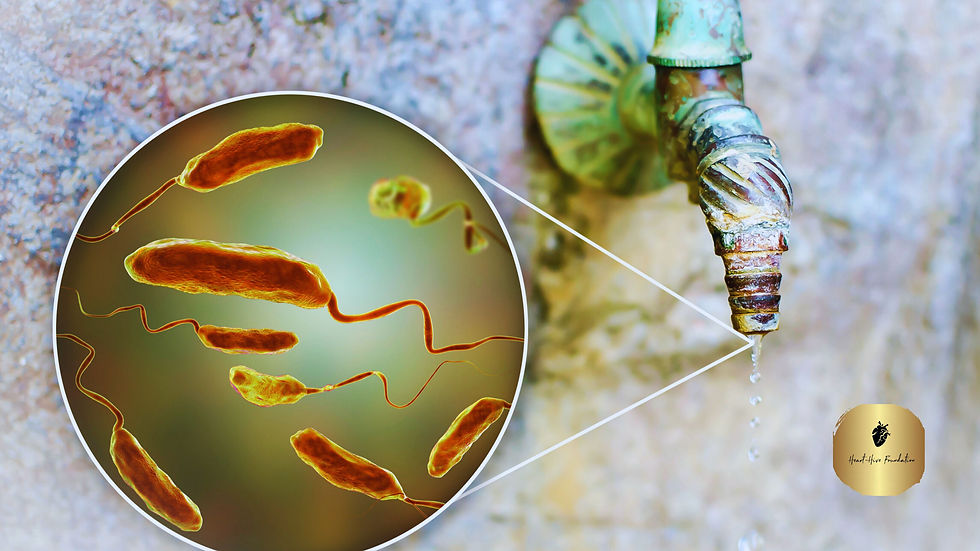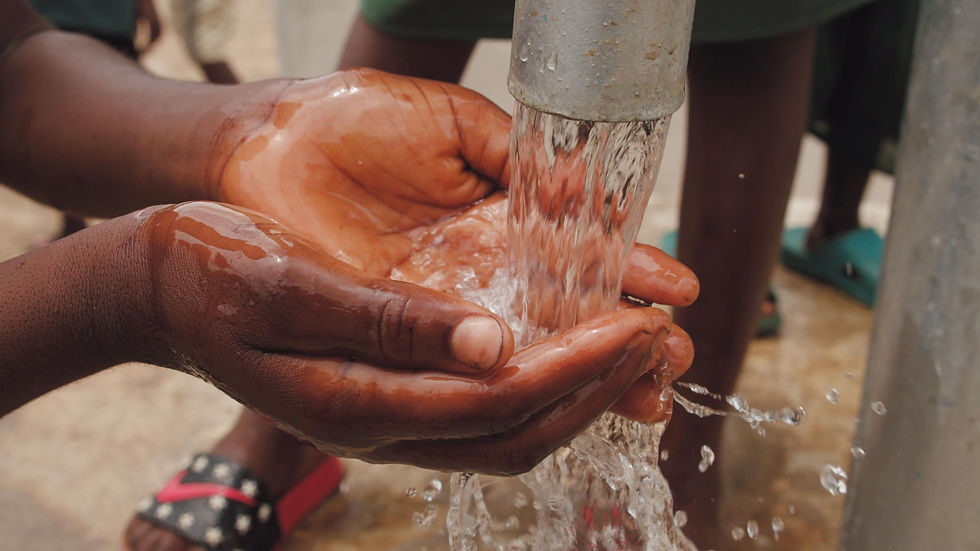Combating Cholera and Waterborne Diseases in Africa
- hearthiveorg

- Sep 1, 2025
- 3 min read

Africa has long been grappling with the challenge of cholera and other waterborne diseases, which continue affecting millions of lives each year. These illnesses often spread rapidly in areas where safe drinking water and sanitation are lacking. Families, especially children, are bearing the greatest risks, facing illness and preventable death from contaminated water.
Understanding Cholera and Its Impact

Cholera is a bacterial infection spreading through contaminated water and food. It causes severe dehydration and can quickly become life-threatening if not addressed. In African regions where sanitation systems are inadequate, outbreaks are emerging frequently, overwhelming fragile healthcare systems.
The Burden of Waterborne Diseases

Aside from cholera, other waterborne diseases such as dysentery, typhoid fever, and hepatitis A are continuously affecting African populations. These illnesses not only cause immediate health problems but are also weakening immune systems, leading to chronic suffering. Communities are struggling with long-term effects, as constant sickness reduces productivity, school attendance, and quality of life.
Children at the Forefront of Risk

Children are especially vulnerable, as their bodies are more susceptible to rapid dehydration caused by diarrheal diseases. Many are falling ill from drinking untreated water, which limits their growth and learning. Entire generations are facing developmental setbacks because of repeated infections from contaminated sources.
The Link Between Poverty and Health
Poverty is closely linked with the spread of cholera and other waterborne diseases. Families living in poverty are lacking access to clean water infrastructure, sanitation, and healthcare. As a result, they are continuing to live in environments where unsafe water remains their only option, perpetuating cycles of disease and hardship.
Communities Striving for Solutions

Across Africa, communities are collaborating to find ways of protecting themselves from contaminated water. Villagers are digging wells, creating makeshift filtration systems, and sharing knowledge about safe hygiene practices. Though these steps are modest, they are strengthening community resilience and reducing risks little by little.
Health Workers and Local Efforts

Local health workers are playing an essential role in managing outbreaks of cholera and other waterborne diseases. They are distributing oral rehydration solutions, promoting hygiene education, and monitoring community health. Their efforts are keeping thousands alive while also creating awareness about disease prevention.
Education as a Preventive Measure
Education is emerging as one of the strongest defenses against cholera and related illnesses. Children are learning the importance of handwashing, safe water storage, and basic sanitation. Schools are becoming places where not only academics are taught but also life-saving hygiene practices.
International Partnerships and Aid

International organizations are partnering with African nations to provide technical support and emergency resources. Aid groups are supplying water purification tablets, vaccines, and sanitation kits during outbreaks. These collaborations are strengthening local capacities and ensuring quicker responses to emergencies.
The Role of Technology and Innovation

Innovative solutions are being introduced to tackle unsafe water supplies. Technologies like solar-powered purification systems and mobile health apps are expanding access to clean water and real-time disease tracking. These innovations are continuing to bring hope and practical change to struggling communities.
The Vision of Heart Hive Foundation
Heart Hive Foundation is standing alongside African communities in raising awareness about clean water and hygiene. The foundation is supporting initiatives that are protecting children and families from the dangers of unsafe water. By working hand-in-hand with local efforts, Heart Hive Foundation is helping communities build healthier and more sustainable futures.
Long-Term Goals for Health and Safety

Lasting solutions require not only emergency responses but also long-term strategies. African nations are striving to build sustainable water infrastructure, improve sanitation, and strengthen healthcare systems. These goals are ensuring that future generations are growing up free from the burden of cholera and other waterborne diseases.
Building Hope for the Future

With continued education, innovation, and collective action, communities across Africa are moving toward a healthier future. The fight against cholera and waterborne diseases is ongoing, but progress is visible in small victories. Through compassion, commitment, and solidarity, organizations like Heart Hive Foundation and global partners are empowering Africa to rise above these challenges.
.png)



Comments